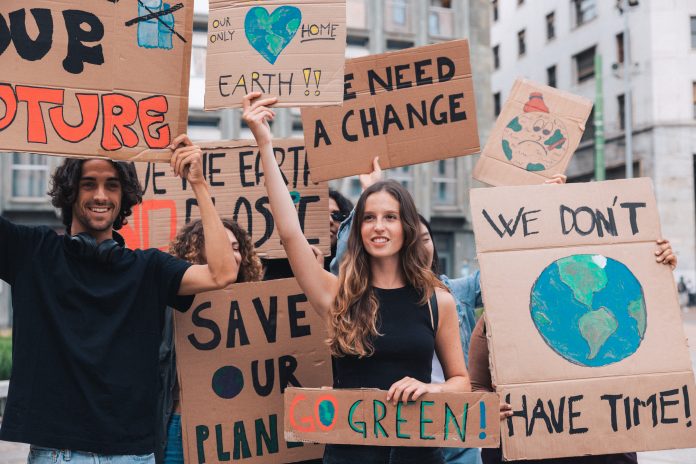Simon Glynn, Founder of Zero Ideas, explains the importance of liberating climate action from politics
Climate change is a universal challenge, which affects all of us and needs action from everybody, now. We can’t solve it through business as usual; that’s why some want to make this a political project. But with less than ten years left for climate action to be decisive, it is not plausible that we can get there by converting the whole world to one universally shared political persuasion.
The need to depoliticize climate action
Instead, we need to depoliticize climate action to promote collective progress. Taking politics out of the equation and liberating climate action will help us to:
- Engage the political Right, who largely share the Left’s concern about climate change today but can’t buy into the consequences of that concern if that means policies like the Green New Deal. ‘Decarbonization requires redistribution’, says a chapter title in Greta Thunberg’s The Climate Book. But what if decarbonization actually requires letting go of redistribution?
- Broaden our solution set. Nuclear energy, carbon capture, and GM foods are viewed with suspicion in the traditional climate movement. Still, they are potentially critical technologies for reaching net zero while delivering prosperity for 9 billion people.
- Act on responsibility and solidarity, not blame and envy. The breakthrough that led to the Paris Agreement was to abandon the idea of divvying up the world’s rapidly declining carbon budget, and have each country contribute its own path to zero.
- Benefit from the licence that business has on climate from society and investors, without compromising that licence by forcing businesses to take political sides.
Revisiting climate change
Climate action is not inevitably political. We have made it so, through deliberate choices. We have the power to revisit these choices and consider liberating climate action from the political agenda it has become bonded to.
The idea that sustainability should mean redistribution dates from the 1992 Rio Earth Summit. This meeting established the United Nations Framework Convention on Climate Change, including the principle that countries should contribute ‘on the basis of equity and in accordance with their common but differentiated responsibilities and respective capabilities,’ with the developed countries, therefore, taking the lead.
But the world has changed dramatically. We have already emitted more carbon since the Rio conference than we did all the time leading up to it. Over the 250 years before Rio, the G7 countries produced 56% of cumulative emissions, and China only 6%. But over the 30 years since, the two have been more similar: 31% from the G7 and 23% from China. The world has become more economically equal, too: the G7’s share of world GDP has fallen from two-thirds to less than half. Developed countries understandably question a system that has locked in historical responsibility while discounting future responsibility. (1)
Environmental, Social and Governance (ESG) construct
Business, too, has been pulled into the redistributive agenda through the Environmental, Social and Governance (ESG) construct. ESG was not supposed to be political. Instead, it was sold as something companies should choose to do in their self-interest. The promise was neatly captured in the title of the UN Global Compact’s 2004 report that introduced the idea of ESG: Who cares wins. (2) Enlightened greed is good.
But this alignment of shared interests is illusory. ESG issues such as reducing poverty or promoting gender equality are redistributive, and thus political, pitching ‘fairness’ against ‘freedom’. When companies try to do the right thing, they discover that the world doesn’t have a universal set of values; one person’s social justice is another person’s woke capitalism.
By treating climate change as one strand of ESG, and as just one of the UN’s 17 Sustainable Development Goals, we have conflated it with social issues that are profound societal ambitions but are inherently political choices. Failure on these issues would be a missed opportunity for humanity but leave us no worse than today. Climate action is not like that: it is an apolitical necessity, where failure would ultimately destroy the way we live today.
Pursuing climate justice?
Of course, climate change itself is full of inequities, but we must be open to the practical implications of pursuing climate justice. Many hailed the agreement on ‘loss and damage’ coming out of COP 27, but the Wall Street Journal led with ‘Biden Signs Up for Climate Reparations. The use of climate policy to soak Americans keeps getting worse. Welcome to the latest climate shakedown.’ (3)
The critical tension here is not between Left and Right, the Global North and South, or societal and environmental issues; it is between ideals and realities. The danger is that the ideals of social and climate justice may be unachievable in practice in the short time we have – and that in giving them priority, we risk failing to achieve both those societal goals and our climate goals.
Simon Glynn is the Founder of the charity Zero Ideas, challenging business thinking on climate change. simon@zeroideas.org











